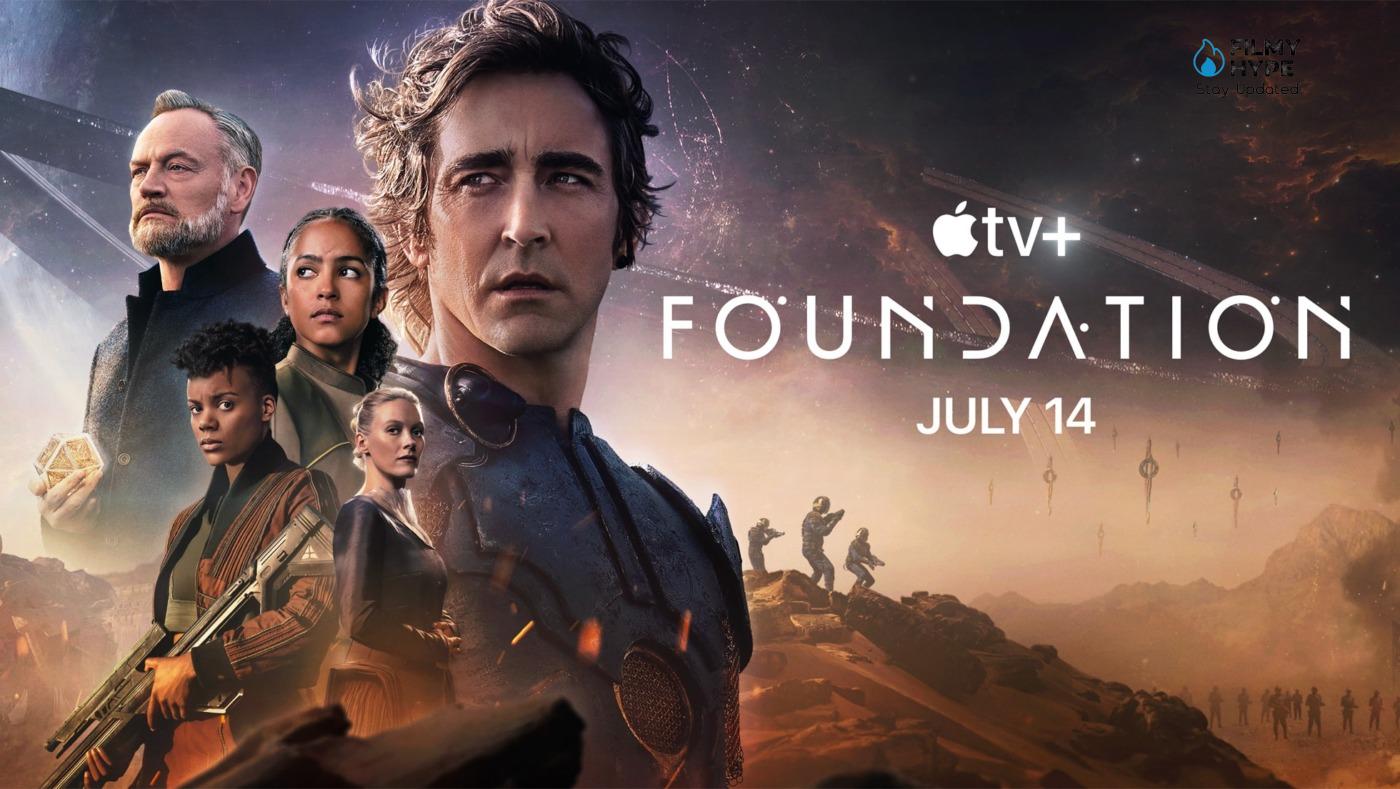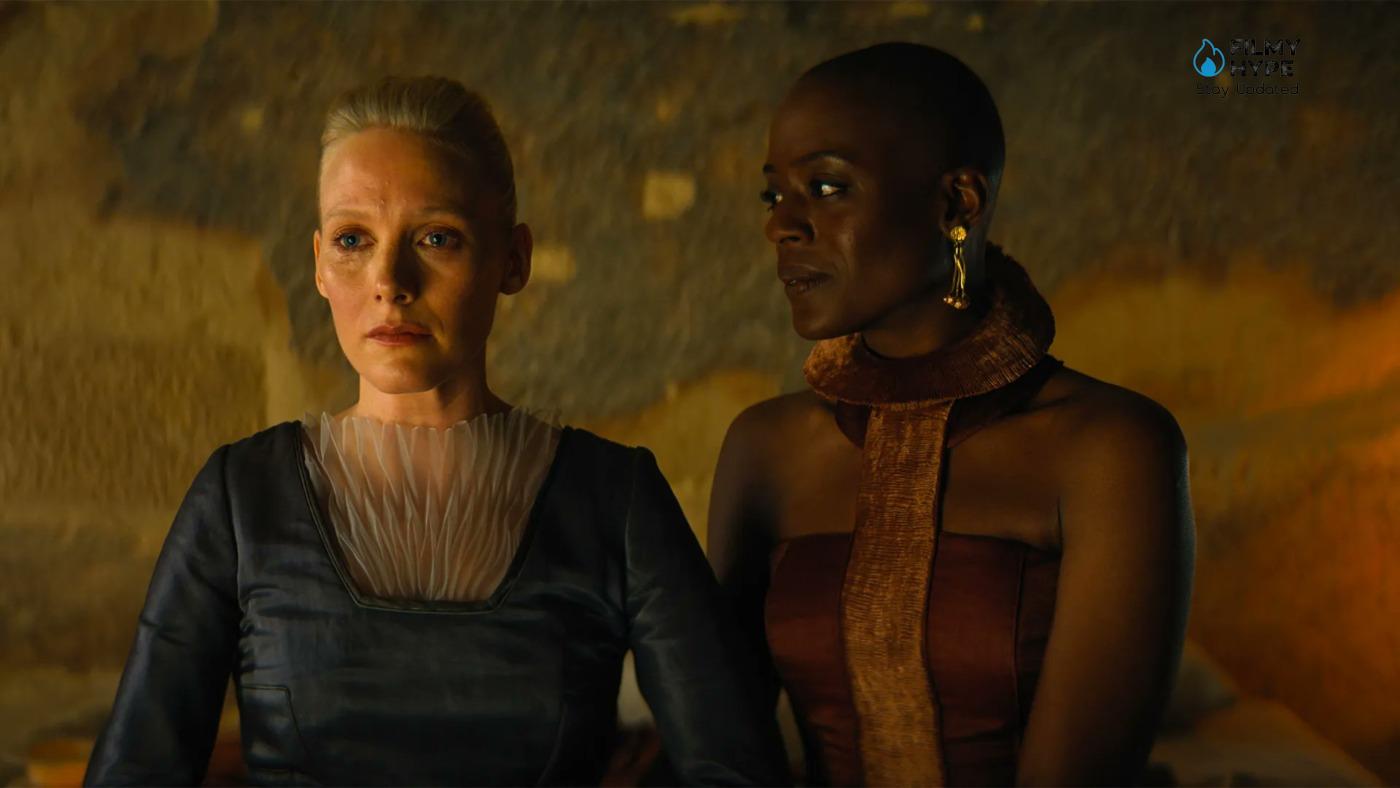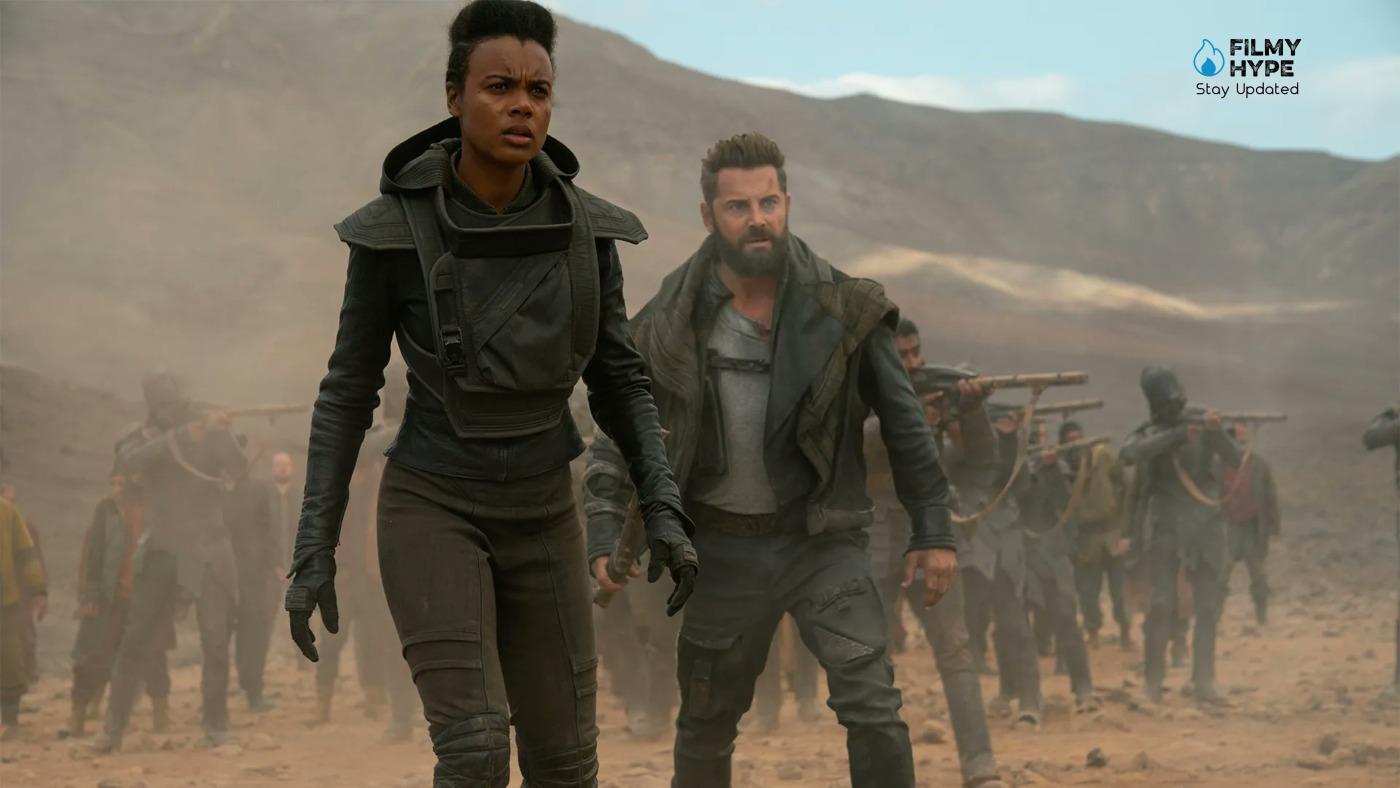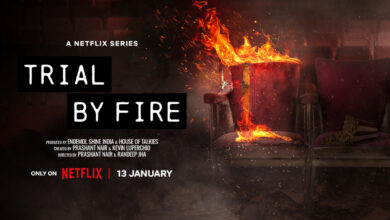Foundation Season 2 Episode 1 Review: Apple Tv+ Series Between Innovation and Fidelity
Cast: Francis Terry, Holt McCallany, Rachel House, Mikael Persbrandt, Ben Daniels, Ella-Rae Smith, Nimrat Kaur, Isabella Laughland
Creators: David S. Goyer, Josh Friedman
Streaming Platform: Apple Tv+
Filmyhype.com Ratings: 4/5 (four stars)
After a long wait, one of the most celebrated series Foundation Season 2 landed on Apple Tv+. The Foundation is the most expensive series ever made via Apple Tv and the visuals of the series are great. Foundation as a series is very simple: you either love it or you hate it. Many of the most fundamentalist fans of Isaac Asimov’s creation did not like the adaptation proposed by Apple TV+ a year ago, but there is no doubt that from an aesthetic, productive, and artistic point of view, we are dealing with a product of the highest level. Maybe too much? The question is not casual but concerns our ability to appreciate (in a general sense) such a complex and ambitious operation, which demands a great deal from its audience.

It’s fascinating to dive back into the sci-fi world that was first Isaac Asimov’s paper, in his impotent seven-volume saga Foundations Cycle, and then television, in David S. Goyer’s adaptation for Apple TV+. We do this in the Foundation Season 2 review, from 14 July on the platform with a weekly appointment, which has testified since the spectacular trailers released as it wanted to try to do even better than the inaugural cycle, expand the time and space in which one timidly entered as spectators. An increasingly vast, complex, and stratified narrative universe, with important new entries – indeed, pawns – in the story told and in the very long-term plan and full of ramifications in space and time of Jared Harris’ Hari Seldon, the psychohistories capable to predict the future to try not to save the universe but to limit its damage (doesn’t it remind you of our Earth today?).
Foundation Season 2 Episode 1 Review: The Story Plot
Foundation restarts from the end of the first, complex season from the project of Hari Seldon (Jared Harris), luminary and founder of Psychohistory, the discipline capable of predicting the future, in this case, the dissolution and fall of the Cleonic Imperium, after millennia of equilibrium. Between attacks, tensions, with an uncertain future but the never-quenching hope of creating a better future, the fusion between two antagonistic civilizations such as Anacreon and Thespis had taken place, with Seldon who finally revealed his plan: to overthrow the tyrannical Imperium, where in meanwhile Brother Dawn (Cassian Bilton) has been killed for his involvement in Azura’s (Amy Tyger) plot, leaving Brother Day (Lee Pace) and Brother Dusk (Terence Mann) deeply disturbed.
Meanwhile, on Synaax, 138 years in the future, Salvor (Leah Harvey) and Gaal (Lou Llobell) meet, and they understand the bond that unites them: Salvor is the daughter of Gaal and Raych. This second season starts from here, which enlightens us on the fate that finally befell the great Seldon, who reappears in front of us, but in a very different way from that expected by Salvor and Gaal. Meanwhile in the Imperium Brother Day narrowly escapes an attempt on his life, but by whom? What remains of the old order is threatened by a new nemesis who seems intent on destroying it from within. The Foundation has finally embraced that religiosity that will lead it straight towards the conflict with the Imperium, while Gaal, Seldon, and Salvor meet a colony of Mentalics capable of altering Psychohistory itself. But what if psychohistory had never really been what everyone thought?

It is from him that the journey of the Foundation Season 2 starts – while a third is already in production and David S. Goyer’s goal is to reach eight vintages – which begins a full century after the events of last season’s finale. What we are catapulted into is a story in media’s res – but everything, as always, will be explained to us later, we just need to be patient given the time this series has always taken, without ever pressing the accelerator to introduce characters, situations, planets, settings, and contexts. However, there is no lack of a series of well-orchestrated action sequences that give more rhythm than the inaugural cycle and that immediately involve Lee Pace’s Emperor, Brother Day, by now decided to get married to find a dynasty that is deliberately hybridized by other religions and cultures, to have a legacy and to be able to survive. All under the eye always waiting for the android of Laura Birn, who has built a carnal relationship with the emperor.
Precisely this seems to be one of the two main themes of these new ten episodes. The relationship between parents and children and above all the legacy that is left to them. It was already the main theme of the entire cycle, if you like, on the generational impact from one century to the next – given the enormous chronological period that Foundation covers, on the desire to rebuild and start over, to create (found, in fact) something to be left to posterity and that we may never see. But in this case, it’s really about blood ties and not, which once again fit into time and space and have sometimes imperceptible connections that will be seen in a butterfly effect that could last millennia. Therefore, it does not focus on the one hand only on the genetics of the Clones (the “new” Dawn of Cassian Bilton and the “old” Sunset of Terrence Mann), on the emperor’s courage to expand in order not to remain the same and remain an echo and on the distrust of the other Council members about the upcoming marriage. But also, on the other hand, the relationship between mother and daughter found in the previous ending, Leah Harvey) and what this relationship will mean for the Foundation and the future of the Galaxy, including their ties to Hari Seldon. They will discover a colony of mentalists with psionic abilities that could even threaten psychohistory itself, to get right to the heart of the story.
Foundation Season 2 Episode 1 Review and Analysis
David Goyer and Josh Friedman are the two names we owe to Foundation, one of the most atypical, surprising, and original TV series of the most recent panorama, especially as regards the science fiction genre, which is not enjoying great health at the moment. Asimov’s saga is considered one of the most important ever in an absolute sense, certainly not only in science fiction, and one can only admire Apple TV+’s willingness to offer the public something that incorporates themes, ideas, and the great author’s vision of humanity. In 1951 Asimov created a work capable of embracing contemporaneity and future perspectives at the same time through an incredible metaphor. Sure, Foundation right from the start he had to deal with the reactions of the most intransigent among Asimov’s fans, about the very heavy changes made to the characters, to the plot, to the point that someone even raised the question: perhaps the end, the Foundation is that it is very connected to the books, despite the titanic budget, which should cover a total of 80 episodes.
However, it must be admitted that even in this Foundation Season 2 the whole work fascinates, captures, and it does so with a very high-profile aesthetic, which other productions should imitate. The screenplay knows how to make the characters move forward without detracting from the dynamism of the plot, with a world-building that, however familiar, continues to have an exotic charm, to speak to us of an imaginative and seductive elsewhere. Lee Pace, Jared Harris, and all the rest put a lot of effort into giving new meaning, pushing their characters to new shores. The ability to predict the future gives way to the need to find new points of reference and new ideas. Foundation in this he wins his bet because, coherently with the ideas of the original author, it is a mirror of our present, of this 21st century which is not clear where it is going, we only know that the past is over, clinging to it is a useless chimera.

This comes from a screenplay that continues to be very sophisticated, takes its time, its pauses, and always makes the characters interesting but above all the complexity of a world in which chaos theory and determinism are embraced, where the relationship between society, time and freedom. Of course, the big problem for the Foundation, from certain points of view, is its complexity, the difficulty in following all the steps, and all the narrative lines, which however is also its greatest value at the same time. It doesn’t happen every day that we are faced with a series so far from the most obvious clichés, but certainly, perhaps today’s audience is not the most suitable for this type of operation, so easily distracted, bored, so overwhelmed by an offer so massive as substantially superfluous most of the time.
Foundation Season 2 can only please fans of the first in a very clear way, however, it is also clear that it will bring a few new ones, given its close connection to the concept of continuity, it’s being a gigantic machine which, like the time it is absolute protagonist, it moves in an autonomous direction, with which it is not possible to come to terms. The tension is very high on all the planets of the Galaxy and the imminent war is breathed thanks to the photography and above all to the soundtrack by Bear McCreary (which coincidentally comes from a sci-fi cult like Battlestar Galactica). David S. Goyer and the other authors aren’t afraid to further expand Asimov’s universe, presenting new entries from the books and beyond: among them the queen and future wife of Emperor Sareth of Cloud Dominion (Ella-Rae Smith), who seems to have a plan of his own in mind along with trusted advisor Rue and the love of Hari’s life, Yanna (Nimrat Kaur), decisive for the psych historian’s mind.
The approach that the production continues to demonstrate in not being afraid to serve so many stories and storylines to keep up with on the viewer’s plate is certainly courageous. The other main theme of this second chapter seems to be religion and its implications, of which we had already had a taste in the inaugural cycle. The Foundation has entered its religious phase, spreading the Church of Seldon throughout the Outer Reach and risking triggering the Second Crisis: War with the Empire. The first of many crises actually, is a series of ramifications out of control that Gaal and Salvor will have to try to fix while trying to understand their role in each other’s existence and the grand design of the universe. When is their destiny predicted by psychohistory and how much free will for man, the creature that seems in the end despite everything the bearer of tomorrow?
Foundation Season 2 Episode 1 Review: The Last Words
Everything is even more impressive and majestic, as we tried to explain in the review of Foundation Season 2, in this second chapter by David S. Goyer from Asimov’s novels. You are not afraid to show further worlds, planets, universes, and timelines that enrich and expand an already complex and stratified narrative fabric. There is great ambition and investment and it is time to get to the heart of the matter, the origins of psychohistory, and the future of clone genetics.






